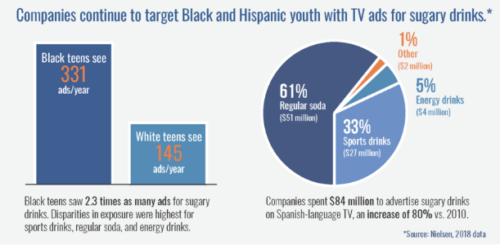by Marion Nestle
Jun
26
2020
Weekend reading: marketing of sugary drinks to minorities
The COVID-19 pandemic has pointed out how the higher risk of complications and death among members of minority groups. The reasons are fairly well established. Members of minority groups are more likely to:
- Be overweight
- Have diet-related risk factors: hypertension, type-2 diabetes, multiple metabolic problens
- Live in high-pollution areas
- Have asthma
- Suffer from the daily stress of discrimination
- Lack sick leave benefits
- Have poor health care
The .latest report from Rudd Center on Food and Obesity Policy, Sugary Drinks FACTS 2020, highlights how sellers of sugary drinks target their products to minority populations. The press release says that the report found:
- In 2018, companies spent $84 million to advertise regular soda, sports drinks, and energy drinks on Spanish-language TV, an increase of 8% versus 2013 and 80% versus 2010.
- Sports drink brands disproportionately advertised on Spanish-language TV, dedicating 21% of their TV advertising budgets to Spanish-language TV, compared to 10% on average for all sugary drinks.
- Compared to White children and teens, Black children saw 2.1 times as many sugary drink ads and Black teens saw 2.3 times as many. Black youth exposure was particularly high for sports drinks, regular soda, and energy drinks.
Click here for the full report.
- Sugary Drink FACTS 2020 Supplement: Examples of social media campaigns targeted to teens and Hispanic and Black youth
- Sugary Drink FACTS 2020 Appendix Tables
- Sugary Drink FACTS 2020 report summary
The report’s main finding:

CNN has an excellent account of this, in which I am quoted.
Experts say soda companies have also taken a page out of the tobacco industry’s marketing playbook, by providing funding for many Black communities and endeavors “in ways that don’t look like advertising, like funding playgrounds in minority neighborhoods, minority community groups, and sponsorship of Black and Hispanic sports figures,” said Marion Nestle, who also authored “Eat, Drink, Vote: An Illustrated Guide to Food Politics.” “These work,” Nestle said. “Minority kids identify soda brands with sports figures, and minority community groups find it hard to oppose soda company marketing when the companies have been so generous.”
The account refers to the CEO of Pepsi’s statement on the company’s efforts to address race. I am quoted again:
“The great irony of Ramon Laguarta’s promises to counter PepsiCo’s conscious or unconscious racist practices in the company, its business, and communities is that none of them addresses targeted marketing,” said Nestle.“The best thing Pepsi could do to improve the health of its customers would be to stop advertising and marketing to children and teenagers, especially those of color,” Nestle added.
Addition, June 29
US Right to Know also has an excellent article on this topic.

